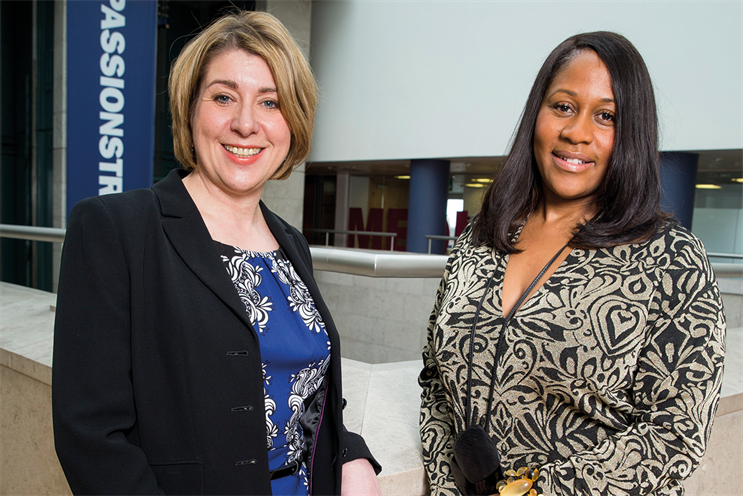
Stress is a subject that crops up a lot in conversation with Diana Tickell and Karen Blackett. And they are not talking about their new pairing as the team tasked with keeping Nabs’ profile and relevance high within an ad industry where ignorance about its services remains widespread – even if this task might seem sufficiently stress-inducing by itself.
For Tickell, the former Barnardo’s marketing chief who has just completed her first year as Nabs’ chief executive, and Blackett, the chairwoman of MediaCom, Britain’s biggest media agency and Nabs’ newly named president, some of the challenges are familiar and ongoing.
Others, though, are the results of the emotional toll exacted on a workforce by an industry where competition is as heavy as the workloads.
The perpetual headache is raising the £1.7 million needed to run Nabs’ services each year. The task is made no easier by the fact that Nabs is just one of the charities competing for the industry’s largesse and it needs to remain top-of-mind when staff turnover is high and most employees are aged under 30.
It is against this background that Nabs has appointed Fold7 as its first retained agency, marking a move away from previous project-based assignments.
"Although people feel warm towards us, we’re not well enough understood by those we need to reach," Tickell acknowledges. "We need a proper brand strategy like I had at Barnardo’s. We need to be more professional in our marketing communications and Fold7 will provide the strategic glue that delivers this in a more impactful way."
That communication will underline the extent to which Nabs has become a much broader organisation than the one set up a little more than 100 years ago to help adlanders falling on hard times.
Tickell’s new strategic approach aims to match the demands of a much-changed industry. The need for Nabs has never been more acute – of the 2,000-plus calls each year to the Nabs Advice Line, 67 per cent are about stress-related work pressures.
This has precipitated a major initiative to raise the issue of stress with industry staffers who are living with the consequences of recession and the demands put on them to do more with less.
The traditionally macho nature of the business has stigmatised the issue, Blackett believes, although Tickell suggests people are now more confident about raising the subject.
"The fact that our business is so competitive means there will always be stress," she adds. "You can’t take it away but you can help people manage it better."
The stress campaign provides a natural link to another Nabs research project, which is focusing on working parents and helping mothers return to the business.
For Blackett, this is yet another manifestation of adland’s evolution. "Twenty years ago, there was likely to be just one parent who worked," she points out. "Today, it’s far more likely to be both parents who work. And that can result in all sorts of tensions."
Meanwhile, Blackett’s presidency may be timely given Nabs’ new commitment to championing greater equality and diversity in the business, complementing the IPA’s target of increasing the number of women and those from ethnic minorities in senior positions by 2020.
For one thing, Blackett is a bus conductor’s daughter and single mother from a second-generation immigrant family and one of a handful of black role models at the industry’s most senior level. She was also voted the most influential black person in Britain in 2014 by the Powerlist 100.
For another, Nabs expects to tap into her experience in launching the first government-backed apprenticeship scheme for the creative industry, offering an NVQ in marketing and communications.
Nepotism is still rife within the industry and role models are scarce, Blackett concedes: "I don’t believe in quotas but I do believe in widening the door. This isn’t just altruism. It makes good business sense. You have to be able to communicate with the society in which you live."
Although insisting Nabs will not be subject to a "strategic quick fix", Tickell’s relatively short time in office has already been marked by a determination to give the charity a more youthful makeover.
A high-profile casualty of that policy has been the Nabs Rugby 7s, an industry institution that has swelled the charity’s coffers since its inception in 1962.
The official reasons for Tickell’s decision to blow the full-time whistle on the event were its dwindling success as a fundraiser and the increasing difficulty of getting agency teams to take part. Unofficially, there is an acknowledgment that Rugby 7s represents an echo of a past from which Nabs is trying to break free.
Taking its place will be Ride Adland, a 24-hour cycling race to be launched in October and aimed at both experienced and novice riders. "It’s important that we keep refreshing our events to make them more relevant to young people," Tickell says.
This begs the question of what will happen to Peterhouse, the Nabs retirement home in Bexhill opened in 1966 but now looking like a throwback to a time when adland offered jobs for life and the industry felt a duty of care to its veterans.
The home has been the subject of internal debate about whether it should be sold off. But with heathcare providers selling off hundreds of homes and the sector in meltdown, Tickell is reluctant to cut Peterhouse loose – not least because it is run on a break-even basis but, also, as she points out: "We’re talking about people’s homes. We mustn’t forget that."
Nor should it be forgotten, Blackett adds, that diversity is also about age and value of experience to the industry. What sort of signal would selling Peterhouse send out, she asks.
With Peterhouse – as with everything else Nabs does from now on, Blackett insists – actions need to speak louder than words: "We know what we need to do – so let’s start doing it."

